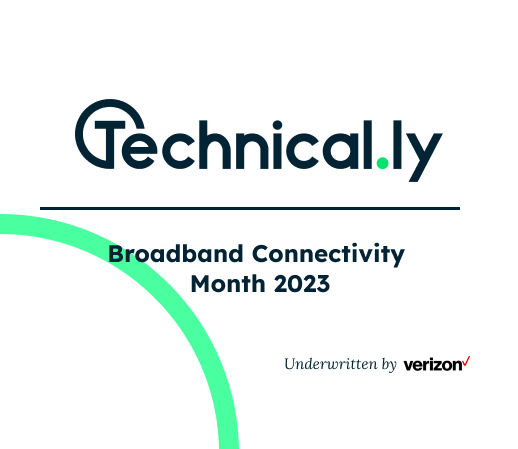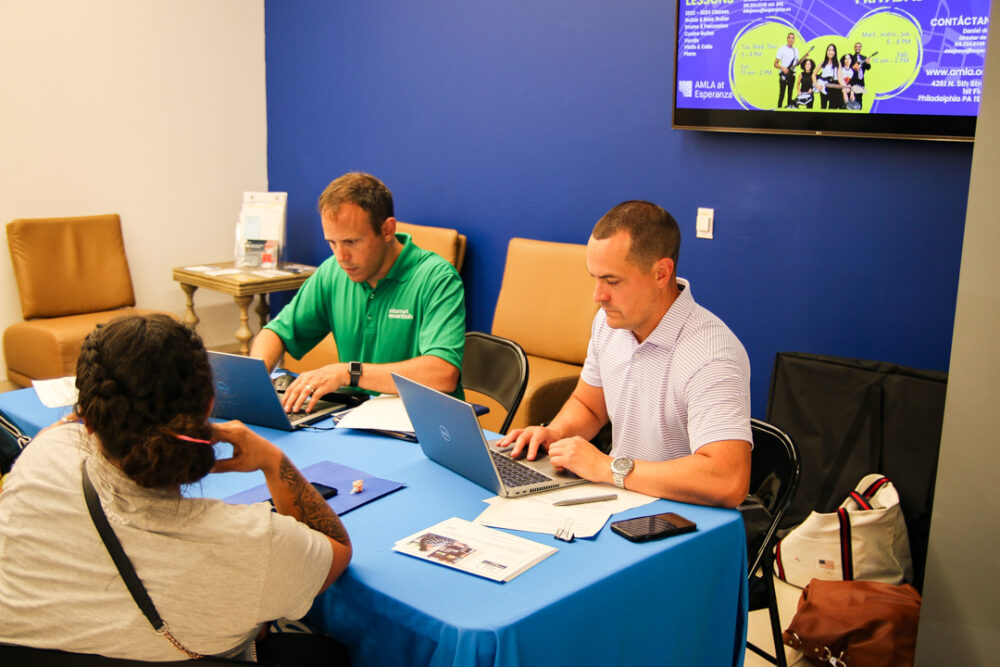The single mom of two said she would finish work after the public library was already closed, so this was the best solution for her kids to work on their assignments, thanks to its free internet access.
Ross’ family connected with someone from Comcast’s Internet Essentials team in 2020 and learned about what is now called the Affordable Connectivity Program (ACP), a $14.2 billion federal benefits program that provides a $30 subsidy for internet service to eligible families.
“Now I don’t have to rush and try to get my daughters to someplace where there’s internet to do homework or do projects,” Ross told Technical.ly. “They can just do it at home.”
The Federal Communications Commission (FCC) announced last week that over 20 million households across the country are enrolled in ACP.
Between this push to spread the word about ACP and the billions of dollars that will be put toward broadband infrastructure expansion, the federal government is investing mightily in digital access.
At a local level, even if there is broadband infrastructure in Philadelphia, thousands of families still can’t afford to pay for internet service. That’s why the City of Philadelphia and other local digital equity advocates have been pushing for eligible families to sign up for ACP, especially as the 2023-2024 school year begins.
Transitioning from PHLConnectED
Over the last year, the City’s Office of Innovation and Technology (OIT) has been working to spread information about the program and get eligible families signed up. Part of this effort has focused on switching families from PHLConnectED, a program that started during the pandemic to offer an internet subsidy to K-12 families in the city.
PHLConnectED’s subsidy was funded through COVID-19 emergency funding from the federal government along with donations from local foundations, Comcast, family foundations and school contributions. Through this program, families received Comcast’s Internet Essentials package or internet hotspots.
Ashley Pollard, digital inclusion manager for OIT, told Technical.ly this month that those funds were running out — the original PHLConnectED plan was set for two years — so OIT had to think about a longer-term solution for an internet subsidy. ACP offered more choice in that it allows families to choose their internet service provider and their service plan, whereas PHLConnectED was limited to Comcast’s Internet Essentials, and it made sense to gov officials to support a federal program that was already available, Pollard said.
Comcast and Verizon are the two biggest internet service providers in Philadelphia, so most families go with plans from one of those two companies, she said.
“If on a limited income, families are deciding between putting food on the table or paying for broadband,” said Eric Reed, VP of state government affairs for Pennsylvania and Delaware at Verizon. “In those cases, internet service is pushed under the table. The ACP is an important tool in our toolbox for bridging the digital divide and creating digital inclusion.
At first, OIT did some test phone banking to families on PHLConnectED to inform them that a switch would be coming up. This was part of its effort to make sure its outreach and communications plan were smooth.
OIT officially started spreading the word about ACP in March, not just to switch over PHLConnectED families, but to also inform other families who are not in the school district that they would be eligible for the subsidy.
Spreading the word
The City’s digital navigators — individuals who offer free technical support and digital resources to Philadelphians, have been integral to the outreach effort by continuing to reach out to PHLConnectED families and hosting tabling events to get people to sign up, Pollard said.
Earlier this month, Comcast coordinated a tabling event with Esperanza, a nonprofit that offers community resources in North Philadelphia. Bret Perkins, SVP of external and government affairs at Comcast, said the telecommunications giant makes it a point to partner with community organizations for digital equity outreach because the community trusts them.
“You have to meet people where they are,” Perkins said. “Sitting down for something that sometimes can feel hard, if you’re sitting across from somebody that you trust, you’re going to stay, you’re going to trust them to walk you through the process.”
OIT updated its script for 211, the United Way-run hotline that connects Philadelphians with social services, to include a screening for ACP eligibility. If they need additional support after the screening, callers can schedule an appointment with a digital navigator.
The office also launched an online screener tool in partnership with the nonprofit Education Superhighway. This tool launched in March and screens users to see if they’re eligible for ACP and if they are, it takes them directly to the ACP application. The site is mobile-friendly and translated into multiple languages.
“The great thing about that, too, is we’re able to partner with Education Superhighway to see on the backend, how many people are using it, where’s the traffic coming from? What are some of the demographics?” Pollard said. “We’ve been getting data updates from the team and have a sense of how our outreach efforts are working.”
And OIT is running a media campaign until the end of September to spread the word about ACP partnered with iHeartMedia and Unified Partnerships. This initiative includes digital and social radio ads, bus shelter ads and link kiosk ads, tailored to align with back-to-school efforts.
PHLConnectED families are switching over
The last day of sponsored service for PHLConnectED was July 31. For families that were receiving that subsidy, their hotpots have now been turned off and any families not switched over to ACP can expect a bill for Internet Essentials in the next few weeks.
Melanie Harris, chief information officer for the School District of Philadelphia, said families should know that since every child in the district is eligible for free and reduced cost lunch, they are also eligible for ACP. Families who are not at an SDP school may be eligible if they apply for benefits such as SNAP, or they can call the resource hotline 211 to screen for eligibility.
The school district is also working with families, especially those who are housing insecure, to keep their hotspots if they previously received them as part of PHLConnectED: “We did not want to have any instability and having to figure out how to move to a paid hotspot there,” Harris said, “so that’s a very specific population.”
The CIO said SDP has also been communicating to families that if they are currently using Internet Essentials, the $30 from ACP will cover that plan, and their internet services will still be free. If they choose to join a different plan with a faster speed that is more expensive, they may be charged the difference.
Outreach efforts in tandem with OIT will continue, Harris said, because connection to the internet is important for students to have access to all the learning materials and resources they need to be successful in school, and the school district does not want any child to feel like they’re missing out.
Digital equity advocates are also doing outreach
The Technology Learning Collaborative (TLC), a local digital equity-focused organization, was awarded a $300,000 competitive grant from the FCC this spring to support ACP outreach in Philadelphia.
Kate Rivera, executive director of TLC, said TLC applied for the grant as the lead agency with eight local partner organizations: Beyond Literacy, Digital Equity Center at Temple University, the ExCITe Center at Drexel University, Indonesian Lantern Media, Norris Square Community Alliance, Penn Asian Senior Services, Talking Tech with Wayne and Tioga United.
“A lot of the population groups that are most underserved are also harder to reach or need really tailored outreach, more high-touch outreach through this idea of these trusted messengers,” Rivera said. That’s those trusted entities Comcast’s Perkins mentioned — “people who already have existing relationships with the communities that they’re trying to serve.”
FCC has been emphasizing the idea of “trusted messengers,” Rivera said, so ACP outreach could be a good opportunity for local organizations who already have relationships with underserved communities to get funded for their work.
This coalition of organizations plans to meet regularly and share strategies for outreach and progress. Rivera said each organization has their own approach that works for their community, but they also have plans to host some combined outreach events.
What’s the future of ACP?
One question for digital equity advocates in the City: What to do if ACP is not renewed and funds run out?
While there isn’t an official end date for the program, experts project that those funds — that $14.2 billion — could run out sometime next year, Rivera noted. Her TLC is advocating for the federal government to allocate more funds to ACP so the program can continue on.
“There have been a lot of people in Philadelphia already who have enrolled in the ACP and it really has made a real dent in closing the digital divide,” Rivera said. “It would be a real shame if all those people suddenly had to pay full price for internet or lose their subsidy and not be able to afford internet and go back to not having internet at home.”
Rivera pointed out that every state is planning to expand broadband infrastructure through funding from the Infrastructure Investment and Jobs Act — Pennsylvania was allotted $1.16 billion, for instance — but people still need to be able to afford it once access is expanded.
As long as ACP is available, OIT will continue to promote it, Pollard said. However, if ACP appears to not be as long term, her team will shift their thinking to what could be the next solution.
“We know that affordability is really critical in Philadelphia, and really determines different adoption rates of broadband,” Pollard said. “Even with an uncertain future for ACP, I think the City is going to be thinking really critically about where it can leverage partnerships and how it can continue to support affordable internet for Philadelphians, because that remains the number one barrier to access.”
As for Ross, ACP has helped her children in the long run with school and has helped her worry less about her kids’ education, she said. Her ACP renewal came up this month, and she is “definitely” planning to renew it.
Disclosure: Comcast is a Technical.ly Ecosystem Builder client. That relationship had no effect on this report.
Sarah Huffman is a 2022-2024 corps member for Report for America, an initiative of The Groundtruth Project that pairs young journalists with local newsrooms. This position is supported by the Lenfest Institute for Journalism.
This editorial article is a part of Broadband Connectivity Month of Technical.ly's editorial calendar, underwritten by Verizon. Verizon is a Technical.ly Ecosystem Builder client.
Before you go...
Please consider supporting Technical.ly to keep our independent journalism strong. Unlike most business-focused media outlets, we don’t have a paywall. Instead, we count on your personal and organizational support.
3 ways to support our work:- Contribute to the Journalism Fund. Charitable giving ensures our information remains free and accessible for residents to discover workforce programs and entrepreneurship pathways. This includes philanthropic grants and individual tax-deductible donations from readers like you.
- Use our Preferred Partners. Our directory of vetted providers offers high-quality recommendations for services our readers need, and each referral supports our journalism.
- Use our services. If you need entrepreneurs and tech leaders to buy your services, are seeking technologists to hire or want more professionals to know about your ecosystem, Technical.ly has the biggest and most engaged audience in the mid-Atlantic. We help companies tell their stories and answer big questions to meet and serve our community.
Join our growing Slack community
Join 5,000 tech professionals and entrepreneurs in our community Slack today!

The person charged in the UnitedHealthcare CEO shooting had a ton of tech connections

From rejection to innovation: How I built a tool to beat AI hiring algorithms at their own game

Where are the country’s most vibrant tech and startup communities?



